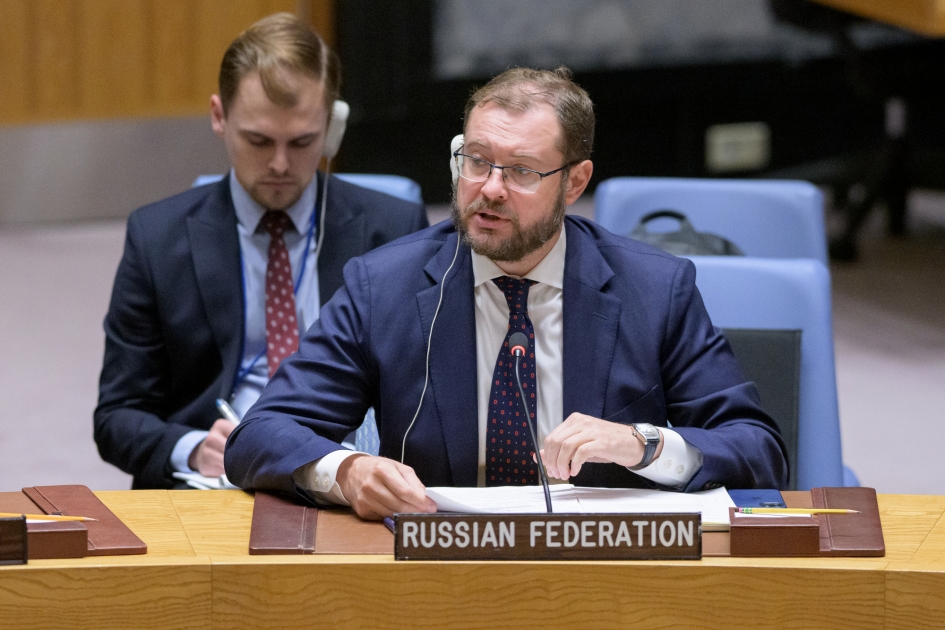Statement by Deputy Permanent Representative Dmitry Chumakov at UNSC debate on climate and security in Africa
Mr.President,
We welcome Ms.Pobee, Mr.Gahouma, and Mr.Youssef for their remarks.
Issues related to climate change are of paramount importance for Russia, especially when those are centered around the climate change affecting regions that are most vulnerable to natural disasters, e.g. Africa. It can hardly be disputed that draughts, floods, forest fires, desertification, hurricanes and other natural calamities that are caused by climatic changes have serious economic and social implications.
We share the concerns that the Gabonese Presidency expressed in the Concept Note to this meeting, which says that in several regions, in particular on the African continent, consequences of the climate change create conditions that provoke contradictions among the communes and even may lead to violence.
In this regard, we believe it reasonable to enhance global efforts to address climate change and help the affected countries adapt to its negative effects, first of all in order to ensure quality changes of the socio-economic situation. We are convinced that the global community needs to take solidary action to address the longstanding problems that keep hitting Africa – access to clean drinking water, ensuring food security, recovery and development of agriculture and industry.
At the same time, there should be no fragmentation of assistance for development and assistance in overcoming environmental degradation. What is needed is effective comprehensive measures, because as underscored in the report of the Intergovernmental Panel on Climate Change (IPCC) entitled “Climate Change 2022: Impacts, Adaptation and Vulnerability”, “compared to other socioeconomic factors, the influence of climate on conflict has been assessed as being relatively weak”. We cannot respond to challenges effectively unless we have sustainable socio-economic development based on national priorities and reflective of local specifics. There needs to be proper infrastructure, valid social services, early warning and response mechanisms.
We pay special attention to African policy documents that highlight the interconnectedness of sustainable development and security, such as Agenda-2063 and the initiative on silencing the guns in Africa. The latter underscores the need to take effective steps to counter draughts, desertification, deforestation and climate change and the nexus between these factors and sustainable development. It is the element that is usually missing when we try to trace this chain from climate to security and that actually provides the main area for the application of our efforts.
As for the role of the Security Council, we need to focus on analyzing the causes of each conflict. There is no uniform gauge to that end, because every mistake we make when trying to identify the reason that exacerbated the contradictions will ultimately reduce the efficiency of response measures. To our regret, such country situations that remain on the UNSC agenda for decades are rather numerous. We see no added value in bringing another generalized criterion herein. By our experience, addition of a new generic topic at the very best may lead to dissipation of our resources, and in the worst case, it may turn into another tool for exerting pressure on host countries.
Let me underscore that if a specific problem evolves in a concrete country or region and the Security Council does have instruments to resolve it, then it should take action. But UNSC-endorsed mandates must not become a set of priorities that appear popular at the UN and are mostly promoted by Western states. In parallel to this, we need to step up humanitarian assistance and socio-economic development, because countries in conflict usually experience socio-economic situations.
Mr.President,
So-called securitization of the climate change is a double-bottomed issue. The main adherers of decarbonization and the green economy are the developed states that have secured their economic prosperity thanks to using natural resources, including fossil fuels. Many of those riches did and continue to arrive from Africa. So when it comes to “increasing the climate ambition”, developed countries started off the positions that surely promised more advantage. Today, they keep rolling back on climate obligations. They have made a conscious choice to sacrifice the global climate agenda for the sake of the political one.
In the meantime, the African region, whose vital interests have been shifted to the periphery of global agenda that is dictated by the West, risks being exposed to even greater damage of climate-associated natural phenomena, as well as ill-conceived unilateral decisions by so-called climate champions. Such double standards and approaches must be excluded from future global cooperation in the area of climate.
Mr.President,
We are convinced that in order to ensure effective functioning of the UN system, we need to preserve the division of labor as envisaged in the Charter of the Organization. Security Council cannot and should not repeat efforts of other bodies of the UN system. Addressing climatic changes and their negative consequences in socio-economic area is solely an issue of sustainable development.
We call to intensify cooperation at multilateral specialized platforms that address the climate change and its negative implications for economy and social aspects, first of all within the UN Framework Convention on Climate Change. As for practical contributions to the adaptation, disaster relief, and early warning systems, the UN Development System can do it with the help of its international project activities – the highly demanded work performed by the UN operative agencies. Russia keeps raising the climate agenda in our contacts with the UN bodies in the interests of African states.
Thank you.
Right of reply:
Allegations have been made against my country that distort the reality. We have responded to such allegations on numerous occasions, so we will not do it today again. However let me underscore the following. We are seeing a clear demonstration of how some states exploit Africa in their own interests. But Russia takes no advantage of Africa's problems. On the contrary, we reiterate our readiness to engage on the African agenda.
